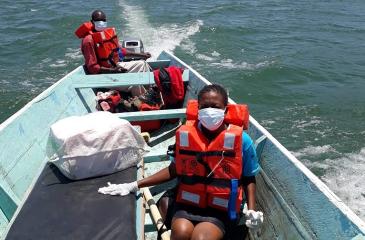For millions of people living in rural communities in sub-Saharan Africa, accessing timely care during maternal and neonatal emergencies remains a complex problem. Researchers from the University of Minnesota have partnered with a local team of Kenyan investigators at Maseno University to launch the Monitoring Maternal Emergency Navigation and Triage on Mfangano (MOMENTUM) Study.
MINNEAPOLIS/ST. PAUL (09/16/2021) — The isolated Suba and Luo communities of Mfangano Island on Lake Victoria in Western Kenya experience some of the highest maternal and neonatal mortality rates in East Africa. To understand factors at the heart of this complex challenge, researchers from the University of Minnesota have partnered with one of the most remote and underserved populations in the world.
Published in Global Public Health, the Monitoring Maternal Emergency Navigation and Triage on Mfangano (MOMENTUM) Study uses an innovative adaptive design to measure delays and barriers faced by mothers and newborns seeking emergency care.
Since 2018, Charles Salmen, MD, director of the Mfangano Community Health Field Station and assistant professor in the Department of Family Medicine and Community Health at the Medical School, and Co-Principal Iinvestigator Louisa Ndunyu, PhD, of Maseno University in Kenya, have mentored a team of local and international investigators to launch the MOMENTUM Study. At the same time, the study was designed to provide pragmatic, actionable data to support a locally-directed health navigation program serving this remote population. Through a 12-month, mixed-methods cohort study, the group of local and international investigators evaluated barriers and delays among patients seeking care for pregnancy-related, obstetric, and neonatal emergencies at nine remote health centers within Mfangano Island Division.
"The study was nearly derailed by the start of the COVID-19 pandemic in the middle of our data collection period. Yet through all, and thanks to the ingenuity and dedication of our team on the ground, and the remote support from our team at the University of Minnesota, we persevered to ensure that the harrowing stories of these mothers and their families were preserved and understood,” said Salmen. “Because they were willing to share their experiences from beginning to end, this study now represents an important contribution towards addressing the vexing problem of maternal emergencies in sub-Saharan Africa."
The MOMENTUM study points to an urgent need for community education efforts regarding awareness of emergency conditions, implementation of streamlined hand-off systems for emergency referrals, as well as policy level interventions to address the recurrent health worker strikes. Particularly, in light of frequent facility closures and staffing interruptions, the study suggests a critical role for community-based care coordinators. The study suggests that these recurrent gaps can, in fact, be bridged by local interventions that flexibly connect the dots for families and providers across dynamic care environments, syncing communication and facilitating timely transport to available resources, and above all, advocating for patients.
With the completion of the first round of quantitative data analysis, the team in Kenya is currently conducting focus group discussions and key informant interviews to understand how the COVID-19 pandemic has impacted maternal and neonatal emergency care on Lake Victoria. This research is led by Kenyan investigators from Maseno University, local research staff at the Ekialo Kiona Center, with remote support from a team of University of Minnesota medical and public health students.
This study was funded by the University of Minnesota Center for Global Health and Social Responsibility. Fieldwork was also supported in part by the Doris Duke International Clinical Research Fellows Program.



